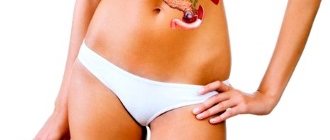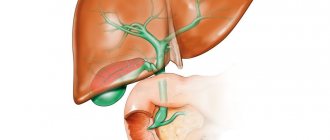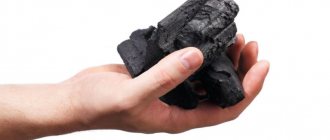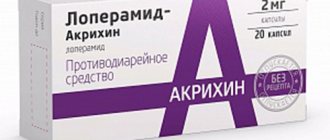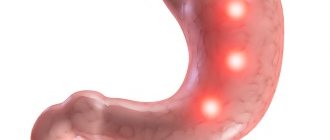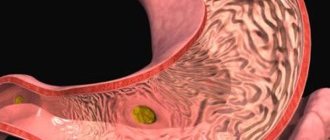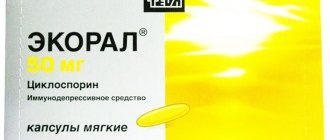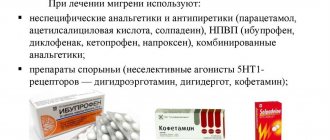Today there are many drugs suitable for the prevention, as well as the treatment of many problems associated with the liver, gall bladder, and excretory tract.
One of these is the medicine Ursoliv. In this article we will consider the instructions for use of the product, pharmacological action, composition, indications and contraindications for use, storage conditions and periods, average prices in Russia and Ukraine, and also indicate analogues.
At the end of the article you can find reviews from people who have already used the product and decided to talk about their impressions of the Ursoliv product.
Release form and composition
Dosage form of Ursoliv - capsules: gelatin hard, size No. 00, white body, pink cap; inside contains white or almost white granular powder (10 pcs. in a cell package made of PVC film and printed varnished aluminum foil, 1-3, 5 or 10 packs in a cardboard box; 100, 50, 30, 20, 10 pcs. in polymer jars or plastic bottles with screw caps, 1 jar or bottle in a cardboard box).
Composition of 1 capsule:
- active substance: ursodeoxycholic acid (UDCA) – 250 mg;
- auxiliary components: lactulose, low molecular weight povidone K17, magnesium stearate, talc, microcrystalline cellulose;
- capsule: gelatin, titanium dioxide, azorubine dye.
Analogs
Instead of Ursoliv, the doctor may prescribe the following medications:
- "Ursosan";
- "Ursomax";
- "Ursofalk";
- "Ursohol";
- "PMS-Ursodiol";
- "Ukrliv";
- "Ursolisin";
- "Choludexan".
Among the listed drugs there are both cheaper and more expensive analogues.
Pharmacological properties
Pharmacodynamics
Ursoliv is a hepatoprotective, choleretic, cholelitholytic, hypolipidemic, hypocholesterolemic drug that has some immunomodulatory properties.
UDCA has a direct protective effect on liver cells and also reduces the hepatotoxicity of hydrophobic bile salts. In addition, ursodeoxycholic acid reduces cholesterol secretion, reduces its intestinal absorption and stimulates the release of cholesterol stones into bile, moderately suppresses cholesterol synthesis in the liver, inhibiting HMC-CoA reductase, and also increases its solubility in the biliary system. The use of Ursoliv leads to partial or complete dissolution of cholesterol gallstones and reduces the concentration of cholesterol in bile. UDCA stimulates the process of formation and excretion of bile, thereby accelerating the elimination of toxic bile acids through the intestines. When penetrating through the hepatocyte membrane, as well as during absorption in the small intestine, UDCA competes with other bile acids, leading to a decrease in the absorption of toxic bile acids in the intestine and their entry into the liver, preventing their cytopathogenic effect.
Ursoliv enhances gastric and pancreatic secretion, lipase activity, reduces the lithogenicity of bile, increasing the concentration of bile acids in it, and has hypoglycemic properties.
It influences immunological reactions, reducing the pathological expression of major histocompatibility complex antigens HLA I on hepatocytes and HLA II on cholangiocytes, suppresses the production of interleukin-2, and reduces the number of eosinophils.
Pharmacokinetics
Absorption of UDCA occurs mainly (90%) in the small intestine. The maximum concentration (Cmax) when taking 250 mg of the drug orally is 3.3 μg/ml, achieved in approximately 2 hours.
Plasma protein binding – 70%. UDCA penetrates the placental barrier. With regular use of Ursoliv in doses of 13–15 mg/kg/day, UDCA becomes the main bile acid in the serum and accounts for 30 to 50% of the total bile acids in the blood. The therapeutic effect of the drug depends on the concentration of UDCA in bile.
Metabolized in the liver to form taurine and glycine conjugates, secreted into bile. From 50 to 70% of the taken dose of UDCA is excreted with bile, and 1% with urine. A small amount enters the colon, is broken down by bacteria, resulting in the formation of lithocholic acid, which is partially absorbed from the colon, sulfated in the liver and excreted within a short period of time in the form of sulfolithocholylglycine or sulfolitocholyltaurine conjugate.
Drug interactions
During treatment with Ursoliv, one should take into account not only the characteristics of the drug, but also its interaction with other drugs.
Some combinations may cause a deterioration in the patient's health and lead to the development of additional diseases.
The main combinations and their consequences for the patient’s body:
- Ursodeoxycholic acid increases the absorption of cyclosporine.
- Concomitant use of Ursoliv with lipid-lowering drugs, estrogens and oral contraceptives increases the likelihood of an increase in the concentration of cholesterol in the bile.
- In combination with Neomycin and Clofibrate, the effectiveness of ursodeoxycholic acid is reduced.
- The absorption of the active substance of the drug is significantly reduced if Ursoliv is used together with aluminum-containing antacids.
Contraindications
- the size of gallstones is more than 20 mm;
- the presence of radiopaque stones in the gallbladder and common bile duct;
- gallbladder atrophy, non-functioning gallbladder, biliary tract obstruction;
- acute inflammatory lesions of the gallbladder, bile ducts and intestines;
- liver cirrhosis in the stage of decompensation;
- liver and kidney failure in an advanced stage;
- active phase of pancreatitis;
- increased sensitivity to any component of Ursoliv;
- pregnancy and lactation;
- body weight ˂ 34 kg.
Side effects
In isolated cases, the patient may experience side effects, which are expressed in such conditions as:
- Nausea, pain in the abdomen and hypochondrium, diarrhea, calcification of stones, vomiting, constipation;
- When treating biliary cirrhosis, the patient may experience decompensation (it goes away immediately after stopping this medication);
- Headache; myalgia, urticaria, malaise, itchy skin, psoriasis, dizziness, angioedema, alopecia, redness of the skin, cough, nasal congestion, runny nose, Quincke's edema.
In case of overdose
In case of overdose, patients experience diarrhea. If this happens, then it is necessary to reduce the dosage taken, and also begin symptomatic therapy, which consists of eliminating signs of dehydration.
To do this, you need to drink plenty of liquid. If diarrhea does not go away within several days, then you should stop taking the drug and administer an electrolyte solution intravenously.
Contraindications
Contraindications to taking this drug are diseases and conditions such as:
The size of the stones is more than 20 mm;- Obstruction of the biliary tract;
- Liver cirrhosis, which is at the stage of decompensation;
- Active form of pancreatitis;
- The presence of stones that contain large amounts of calcium;
- Diseases of the gallbladder, intestines, and bile ducts, which are in acute form;
- Allergy to the components of the drug Ursoliv;
- Children and adults who weigh less than 34 kg.
This drug is not recommended for use in the presence of severe hepatic or renal failure.
Pregnancy
During pregnancy, Ursoliv should be avoided. This is due to the fact that the active substance of the drug has the ability to penetrate the placenta, causing a negative effect on the fetus.
It is also better to avoid taking this medication during breastfeeding. This is due to the fact that the drug can penetrate into a girl’s milk. If it is not possible to find a gentle analogue, then Ursoliv can be taken, but the child must be switched to artificial nutrition.
special instructions
This section provides important information for a special category of citizens.
Driving
It is unacceptable to drive if you have suddenly taken medication.
Pregnancy
If a woman plans to become a mother in the near future, then she should refrain from taking pills.
Taking the medication is strictly contraindicated during pregnancy, as well as during breastfeeding. If you still need to take medication during breastfeeding, then the natural method of feeding should be suspended.
Reception by children
It is not recommended to give this drug to a child whose weight is less than 34 kilograms.
Liver diseases
Intended for the treatment of liver diseases.
Kidney diseases
Taking the medicine is not allowed if a person has a severe form of renal failure.
Sales of goods
Strictly according to the recipe.
Compatibility of alcohol and drugs
Completely incompatible.
Instructions for use of Ursoliv: method and dosage
Ursoliv is taken orally with a sufficient amount of liquid. In cases where it is difficult for the patient to swallow the capsule, you can open it and take the contents.
Recommended dosage of Ursoliv:
- dissolution of cholesterol gallstones: 10 mg/kg/day, that is, for body weight up to 60 kg – 2 capsules, for body weight 60–80 kg – 3 capsules, for body weight 80–100 kg – 4 capsules, for body weight ˃ 100 kg – 5 capsules. Capsules should be taken in the evening before bed. Course duration is 6–12 months. In order to prevent relapses, it is recommended to continue taking the drug for several months after the stones have dissolved;
- symptomatic treatment of primary biliary cirrhosis: 10–15 mg/kg/day, that is, with a body weight of 34–50 kg – 2 capsules per day (1 capsule in the morning and evening), with a body weight of 51–65 kg – 3 capsules per day (1 capsule in the morning, afternoon and evening), with a body weight of 66–85 kg – 4 capsules per day (1 capsule in the morning and afternoon and 2 capsules in the evening), with a body weight of 86–110 kg – 5 capsules per day (according to 1 capsule in the morning and 2 capsules in the afternoon and evening), with body weight ˃ 110 kg – 6 capsules per day (2 capsules in the morning, afternoon and evening);
- biliary reflux gastritis: 1 capsule per day, before bedtime. Course duration is from 10 days to 6 months, if necessary, therapy can be extended to 2 years;
- chronic hepatitis of various etiologies, alcoholic liver disease, non-alcoholic fatty liver disease: 10–15 mg/kg/day, divided into 2–3 doses. Course duration – 0.5–1 year;
- primary sclerosing cholangitis, cystic fibrosis (cystic fibrosis): 12–15 mg/kg/day, if necessary, the dose can be increased to 20–30 mg/kg/day, the daily dose is divided into 2–3 doses. Course duration – from 0.5 year to several years;
- biliary dyskinesia of the hypokinetic type: 10 mg/kg/day, divided into 2 doses. The duration of the course is from 2 to 8 weeks, if necessary the course should be repeated.
Indications
Ursoliv is prescribed in the following cases:
- The patient has X-ray negative gallstones of a cholesterol nature, which are no more than 15 mm in diameter with a functioning gallbladder.
- Biliary reflux gastritis.
- Detection of primary biliary cirrhosis (PBC) of the liver in the absence of any signs of decompensation (in this case, it is prescribed for the treatment of symptoms of the disease).
- Hepatobiliary disorders in patients from 6 to 18 years of age (with cystic fibrosis).
Side effects
- digestive system: nausea, vomiting, pain in the epigastric region and right hypochondrium, constipation, transient increase in the activity of liver transaminases, calcification of gallstones, diarrhea;
- other undesirable effects: malaise, myalgia, headache, dizziness, allergic reactions (itching, urticaria, angioedema).
When taking Ursoliv for the treatment of biliary cirrhosis, transient decompensation of liver cirrhosis is possible, which goes away on its own after discontinuation of the drug.
Reviews
Patients usually leave positive reviews of this medicine. This is due to the fact that the drug begins to act in a short time, improving the general condition of the patient. Many of the patients who took it wrote in their reviews that this drug should be in every first aid kit.
Among the negative aspects, people note a large list of contraindications. In addition, people also do not like the presence of side effects, as a result of which the patient experienced discomfort. In addition, some complain about the high cost.
Did you know that the most common diseases of the 21st century are liver problems? More details:
- How to recognize the first signs of hepatitis and effectively cope with the disease?
- An interesting article about liver cirrhosis, you will learn about the history of the disease and its prevalence in the world.
- Pain or discomfort in the right hypochondrium? Perhaps it's hepatosis! How can it be cured?
special instructions
When using Ursoliv to dissolve gallstones, it is advisable to conduct a biochemical blood test monthly and then once every 3 months to determine the activity of liver transaminases, gamma-glutamyl transpeptidase, alkaline phosphatase, and bilirubin concentration. In case of elevated levels, discontinuation of the drug is recommended.
To monitor the results of therapy, ultrasound and x-ray examination of the biliary tract should be performed once every 6 months. If partial dissolution of the stones has not occurred within 0.5–1 year, it is unlikely that further treatment will be effective.
Treatment should be interrupted in case of calcification of stones, frequent attacks of biliary colic, or impaired contractility of the gallbladder.
After complete dissolution of the stones, it is recommended to continue therapy for another 3 months in order to exclude relapses.
Impact on the ability to drive vehicles and complex mechanisms
According to the instructions, Ursoliv does not reduce the ability to concentrate, as well as the speed of psychomotor reactions.
Side effects
Side effects can be observed both from the gastrointestinal tract and the liver, gall bladder, and hypersensitivity reactions are also possible. Here is their list:
- diarrhea;
- pasty stools;
- abdominal pain in the right hypochondrium;
- nausea, vomiting;
- calcification of gallstones;
- decompensation of liver cirrhosis;
- rash, urticaria;
- headache;
- malaise;
- dizziness.
Decompensation of liver cirrhosis is rare and stops immediately after stopping Ursoliv.
If you miscalculate the dosage or take more capsules than you should, you may experience diarrhea. The appearance of other symptoms does not occur, since the active substance will still be absorbed in quantities possible for the body, the rest will be excreted in the feces.
If diarrhea appears, then this is the first signal that you need to reduce the dose. If this does not help, then it is better to stop taking Ursoliv.
Similar drugs:
- Carsil Dragee
- Ascorutin Oral tablets
- Yogurt Capsule
- Ergoferon () Lozenges
- Magne B6 Oral tablets
- Omez Capsule
- Papaverine Oral tablets
** The Drug Directory is intended for informational purposes only. For more complete information, please refer to the manufacturer's instructions. Do not self-medicate; Before starting to use the drug Ursoliv, you should consult a doctor. EUROLAB is not responsible for the consequences caused by the use of information posted on the portal. Any information on the site does not replace medical advice and cannot serve as a guarantee of the positive effect of the drug.
Are you interested in the drug Ursoliv? Do you want to know more detailed information or do you need a doctor's examination? Or do you need an inspection? You can make an appointment with a doctor - the Euro lab is always at your service! The best doctors will examine you, advise you, provide the necessary assistance and make a diagnosis. You can also call a doctor at home . Euro lab clinic is open for you around the clock.
** Attention! The information presented in this medication guide is intended for medical professionals and should not be used as a basis for self-medication. The description of the drug Ursoliv is provided for informational purposes only and is not intended for prescribing treatment without the participation of a doctor. Patients need to consult a specialist!
If you are interested in any other drugs and medications, their descriptions and instructions for use, information about the composition and form of release, indications for use and side effects, methods of use, prices and reviews of drugs, or you have any other questions and suggestions - write to us, we will definitely try to help you.
Composition and principle of action of Ursoliv
Bile acids, as a rule, are used if the patient's gallbladder becomes inflamed, the synthesis and passage of bile is disrupted, and gallstone disease or chronic hepatitis begins to gradually develop.
Ursoliv is one of the most budget-friendly hepatoprotectors in this segment. At the same time, it is quite effective and safe. The active ingredient is ursodeoxycholic acid; one capsule contains 250 mg. The auxiliary components are povidone, lactulose, magnesium stearate, talc, microcrystalline cellulose.
According to the instructions, the drug has the following effects:
- Immunomodulatory. Bile acid restores the integrity of liver cell membranes, accelerates local reparative processes and, accordingly, increases the body's susceptibility to infectious and viral agents. Experts note that Ursoliv perfectly helps to cope with viral hepatitis. When ursodeoxycholic acid and antiviral drugs are used together, hepatitis goes into stable remission much faster.
- Cholelitholytic. This means that when using capsules, the lithogenicity of bile is reduced, that is, the likelihood of developing cholelithiasis is significantly reduced.
- Hypocholesterolemic. Ursodeoxycholic acid has a positive effect on lipid metabolism. With long-term use of Ursoliv, the level of high-density lipoproteins and triglycerides decreases.
- Hepatoprotective. The active component protects the liver from the effects of harmful toxins and metabolites, has a membrane-stabilizing effect, and binds free radicals.
- Choleretic. When consuming capsules, the synthesis and passage of bile is stabilized, and the elimination of toxic bile acids through the intestines is accelerated.
Among other things, ursodeoxycholic acid enhances gastric and pancreatic secretion, increases lipase activity and even has a mild hypoglycemic effect, that is, it slightly reduces blood sugar levels.
Ursodeoxycholic acid is absorbed in the small intestine, and the maximum concentration of the component in plasma is observed 2-3 hours after taking the capsules. The binding rate to plasma proteins is high and is at least 70%. Drug metabolites are excreted through bile and urine.
Cost and analogues
Ursoliv is allowed to be sold throughout Russia, since the drug is included in the RLS (register of medicines). You can buy this medicine both in large cities of the country and in smaller ones.
The price of Ursoliv (100 tablets) and the cost of its analogues are approximately the same and can range from 120 to 1.5 thousand rubles. It may vary and be adjusted slightly in different regions.
Pharmaceutical companies produce a large number of substitutes for this medicine. Which analogues are cheaper than Ursoliv and which are more expensive can be determined based on prices at the nearest pharmacy. The most popular and frequently purchased are the following:
- Ukrliv;
- Ursodex;
- Ursomax;
- Ursofalk;
- Choludexan;
- Livodex.
They can be taken only after consultation with your doctor.
Ursoliv is a high-quality hepatoprotective drug. With its help, you can cure various liver diseases and also prevent their recurrence. If you use the pills correctly and follow all doctor’s recommendations, you can significantly speed up your recovery and avoid a large number of complications.
Reviews about Ursolive
Judging by patient reviews, Ursoliv tablets are worth buying. Almost all patients were satisfied with the result - they claim that the medicine helped dissolve cholesterol stones and improve liver functionality in general.
There are also bad reviews. For some patients, the medication did not help get rid of cholesterol stones and stabilize the functioning of the hepatobiliary system.
Doctors explain the diametric opposite of reviews by the individual characteristics of patients. If a person has secondary liver diseases or cholesterol stones have succumbed to calcification, then Ursoliv will certainly not be very effective. By the way, according to doctors, this medication is in no way inferior to more expensive UDCA-based drugs manufactured in the EU, Israel, the USA and Asian countries.

